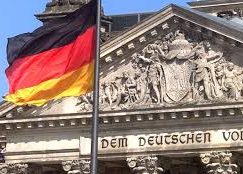Germany makes political capital out of Beethoven’s birthday
mainA message from the German President:
‘Who can better express his great legacy than a united and democratic Germany….’
Hmmmm.
Beethoven left Germany as soon as he possibly could and went to live in Austria.







He went to Vienna (which happened to be in Austria) to study with Mozart. But when he arrived, he learned his mother was about to die and he went back to Bonn (which happened to be in Germany). Stayed for 5 years. Then went to Vienna again to study with Haydn. People back then were more progressive than some small minded people today when it comes to silly nationalistic feelings. Beethoven didn’t care what the nation was called. He was above that. He wanted to study with the best, wherever they lived.
Thank you for that. I found that last comment from Norman just stupid. Beethovens music is above nationalism and is tremendously powerful for the transformation of lower human sentiments of all kinds.
When I feel my lower sentiments again I play Boulez which is more effective. You forget everything.
Sally
Well said. I’d like only to add that Austria was where Hitler acquired his anti-Semitism, just reading between the lines of this anti-Teutonic slander.
Play it again Franky.
It is still positive that the head of state mentions Beethoven’s birthday. No matter when Beethoven left, he was still born in Bonn.
The reason that B went to Vienna was not to get out of Germany as soon as he could, but because Vienna was the musical capital of the German-speaking lands, and the place where Haydn and Mozart lived and worked. Famous Haydn had visited Bonn a couple of times and must have made a deep impression upon B. Germany as a country did not exist at the time but was split-up in numerous small countries. Another strong reason was that the court in Bonn was strongly related to the Viennese court since the ruler in Bonn was a brother of the Austrian emperor, B got recommendations from both the court and a nobleman who was also related to Vienna. The contacts were already in place and the opportunities in Vienna were tempting, as they would have been in Paris if there had not been a revolution. Had Bonn be related to, say, Munich or Berlin, Beethoven would have gone to those places.
Excellent and interesting INFO
DANKE SCHÖN !!
You’re welcome…..
Not quite, Norman, because there was no Germany from which B. could have gone to Austria at the time he moved from Bonn to Vienna.
Well, at his time he went from one territory (Kurköln) of the Holy Roman Empire to its capital (Vienna) and the Archduchy of Austria. He definitely did not see this as “leaving Germany”. When you leave Cardiff and go to London you wouldn’t claim to “leave Great Britain”, would you ? In case he would have left for Berlin or Dresden there wouldn’t have been any difference to “leaving for Vienna”. A man from Bonn, Berlin, Vienna, Dresden etc. would have spoken German and regarded himself as “deutsch/teutsch”. Things have changed since then and Bismarck eventually opposed Austria as part of the (newly founded) empire.
It is said that Austria’s greatest accomplishment in the 20th century was convincing the world that Beethoven was Austrian and Hitler was German.
This is something that is claimed often, but I have personally never come across anyone saying that Beethoven was Austrian. It’s clear that they both would’ve self-identified as German. Hilter, born in Austria, was an ideological German (ultra-)nationalist who (with agreement of many/most Austrians) literally wiped Austria off the map – both as an independent country and as a name (Ostmark, Oberdonau, Niederdonau). In Beethoven’s time Austrian was just a sub-category of German, like Bavarian, Prussian etc. . It took more than 100 years from Napoleon until after WW2 for the identities to become seperate and distinct.
Reminds me of the almost classical saying of Einstein …..
When Beethoven moved to Vienna, in 1792, he was not leaving Germany for Austria. Austria was still part of Germany, i.e., the Holy Roman Empire of the German Nation, and was just as much German as were Bavaria, Saxony, Prussia, etc. Napoleon put an end to the Holy Roman Empire, but the development of a clear distinction between Austria and the rest of Germany took a while, and a war or two, to be thoroughly sorted out. Nor did the political separation obliviate the cultural affinities.
Did Germany as a country even exist in 1770?
There are even people doubting the existence of Germany today, including people living in Germany.
Bone-chilling headline: “Deutschland ist welt meister!” Thankfully it’s only after Germany won World Cup.
No he didn’t. It may have escaped your attention, but Austria was in Beethoven’s day pretty much part of Germany, and the Austrian head of state was the Emperor of the Holy Roman Empire, and later the leading monarch of the German Federation. In 1919 every single party of the German National Assembly that drafted the Weimar constitution, and every single Austrian party wanted Germany and Austria to be reunited. The Entente prohibited it.
Think about it. In 1925 Hindenburg won the presidential election by less than a million votes over the Catholic candidate Wilhelm Marx, a staunch supporter of democracy and the rule of law. Add a few million Catholic Austrian voters, and Marx would have been President, effectively closing the door on that fellow who succeeded Hindenburg as well…
These are days gone by, and nobody in Germany or Austria wants any reversal or unification any longer. But in 1792 Vienna was as much a German city as Bonn.
On p. 4 of Jan Swafford’s Beethoven: Anguish and Triumph, I read that “In the eighteenth century there had never been a country of Germany or Austria.” Beethoven was born in Bonn which was the seat of the Elector/Archbishop of Cologne and a part of the Holy Roman Empire whose emperor happened to reside in Vienna.
The fact that amongst the greatest musical geniuses in history stem from Germanic culture is no accident, that which has absolutely no bearing on a political agenda or propaganda of any twisted human mind can possibly concoct of.
Beethoven is simply Beethoven, among the greatest, and the
most beloved “human” of all the composers who expressed the deepest sense of Joy and pains all living human beings experience.
That is why his music touches and unites us all humanity hands down, and will continue to do so so long as human beings shall continue to thrive in this world.
Beautifully expressed
It was, of course, also connected to the fact that Germany always was a federal state (except during the days of Hitler and later the GDR). A federal state with numerous small and even smaller capitals. Many of these “states” were miniscule, with zero chance to have an impact on politics or military matters.
But even the smallest principality could afford a court composer and an orchestra, which in turn meant great employment opportunities for musicians. Compare this to England (= London) and France (= Paris). Germany is not just Vienna, but also Mannheim (Stamitz), Hamburg (Telemann), Leipzig (Bach), Bayreuth (Wagner), Zerbst (Fasch), and so on and so on.
Dresden (Schütz, Hasse, Weber, Wagner), Berlin (Spontini, Meyerbeer, Nicolai, R.Strauss)…
– Thanks for giving Norman a very needed history lesson people! You all rock!
You commit what is called Geschichtsklitterung in German, meaning falsifying history. When Beethoven left his hometown of Bonn, we still had the Holy Roman Empire of German Nations, and Austria was one of them. The Habsburg Emperor was the emperor of all Germany.
I often misunderstood it as Gesichtsklitterung when in Germany to visit my old uncle, who never wants to mention the war and when someone else absentmindedly mentions it, his face goes into cramps.
Sally
NL: “Beethoven left Germany as soon as he possibly could and went to live in Austria.”
I remember years ago reading an old German sort-of joke:
“We gave you Beethoven, and you return the favor by giving us Hitler?”
Sour grapes?
Indeed, these must be hard times for dedicated Brexiteers.
Let the “Ode of Joy” haunt them until the remainders of the UK beg for re-entry into the EU!
If the general discontent across the EU is anything to go by, I doubt if there’ll be an EU to move back to.
Anyway, we know where the real sour grapes are coming from. The sooner the UK imposes a high tariff on this unpleasant fruit, the better.
Gustavo seems to see Brexiteers everywhere. Remember that Beethoven ripped off the title page of his Eroica in 1804 out of discontent with the then new form of Federalism, caused by a former revolutionary anti-monarch, who wanted to crown himself and his sibblings “Emperor(s) of Europe”. Despotism through “Democracy”. Sounds familiar?
Think about it. Now, today’s Multifederalists have hijacked the “Ode to the Joy” as the “official” Anthem of the EU (former European Community – former Common Market, the latter being what the Britts had joined back in 1973, in the first place).
Well, some europeans are still p*ssed off, and so would Beethoven be.
A quite confused comment.
“A quite confused comment” – please explain what’s confused about it.
I don’t know, that’s the point.
Well, by that reckoning we cannot claim Delius as an English composer – and I am sure there must be several other composers who also fall into this category.
Moving to Austria is what you do if you love Germany, have the feeling that you cannot get enough Germany and need a place that can offer you more Germany.
And you want to be land-locked and spread pork lard on your bread instead of peanut butter like everyone else.
There is no more Viennese place than Vienna itself.
“Beethoven left Germany as soon as he possibly could and went to live in Austria.”
This one beats “Beethoven became deaf towards the end of his life” by a mile.
There is a story that claims that Beethoven was never deaf, and that he simulated deafness to escape the dreary obligations of piano teaching of the ladies of the nobility and all the practicing of giving concerts himself – he needed time and isolation.
John: Do you have any knowledge of the confessions in the Heiligenstadt Testament, addressed to his brothers Johann & Karl?…
John didn’t say he believes the rumour. He is merely pointing out that there are no end of crazy rumours about such matters. Norman seems to have invented another one.
According to the mentioned story, that document was meant for posterity, hence it was never sent to his brothers, knowing that they would throw it in the bin.
A better case might be made for Brahms. The separate, modern state of Germany dates only from 1848. Most contributors here know their history, and their Beethoven. Even Metternich wasn’t Viennese or even Austrian by today’s maps. Mozart in leaving autonomous Salzburg for Vienna did much the same thing as Beethoven. Well done group!
Any country would be proud to own Beethoven geographically or ethnically. Holland has a claim. The German president could have marked his anniversary more gracefully by giving him to the world, which is still a little too small for him.
I just learned that Metternich played cello to his emperor’s violin in the imperial string quartet. A Viennese proverb runs “Every Viennese has a Czdch grandmother.”
Edgar: Bohemian rather.
The more salient date is 1866.
Brahms had a bust of Bismarck in his room, he was an enthusiastic fan of the iron chancellor. Probably he had not much understanding of the nature of Bismarck’s ‘nation building’ and was merely a patriot.
One of Brahms’s leas-known and -performed works is the “Triumphlied” celebrating German victory in the Franco-Prussian war of 1871. Another is his cantata “Rinaldo” for solo tenor, male choir as in the Alto Rhapsody, and orchestra, his nearest approach to writing an opera.
The Triumpflied is a not very good imitation of Handel….
Austria was a massive Empire which ruled a chunk of “Germany” under the HRE. Germany as a nation state had to wait to well after auld Ludwig. No wonder he left Bonn a complete backwater and a career dead end.
I wonder what he would have made of UK in 2020. Brexit effectively declaring a trade war on itself. At least we in Ireland have a shipping route Dunkirk to Rosslare bypassing, the tunnel, Dover and M25 madness.
Bonn was not a backwater at the end of teh 18th century, it was an island of Enlightenment thinking, thanks to the ruler (a Habsburg and brother of the Viennese emperor). Beethoven absorbed lots of the philosophers and ideas that sipped into Bonn, especially at the university.
The “German President’s” message expressed the hope that Germany should be inspired by Beethoven. There is no grandstanding or taking undue credit here. Your comment is rooted in your antipathy.
I do find Norman’s insinuations quite childish and unnecessary. Did Samuel Beckett stop being an Irishman just because he spent so much of his life in France (and while we’re on the subject try making a list of the many, many Irish artists and writers who were driven from the homeland they loved because of its Catholic bigotry and intolerance)? And what about the many pianists of foreign extraction who have chosen to make their home in London? Are they any the less Russian, Hungarian, Japanese or Austrian for doing so?
Beethoven didn’t leave “Germany”. Germany didn’t exist until Bismarck forged it nearly a half a century after Beethoven died.
Germans have every right to be proud of Beethoven. He went to Vienna because it was the Mecca of music in the German speaking world.
Germans should also be no less proud of Handel, even though he finally found his greatest success in England.
BRAVO, lieber Daniel Barenboim!
The way I see it, Vienna was where Beethoven blossomed as a musician. But Bonn was where he had already formed his intellectual/political/spiritual philosophy. The 9th Symphony could not have been produced by someone who had been born and raised in Vienna as it was in those days! In his heart, Beethoven was never truly Viennese (or “Austrian”) but remained a man of Bonn to the end of his days. Since Bonn later became part of “Germany”, I think the German President is correct, and splitting this hair is pointless.
Agreed, that is also the impression when one reads a compilation of the conversation books. In his later eyars he dreamt of travelling to the Rhineland again and see the surroundings of his youth. His best friends were people from that area who settled in Vienna. What he did not like of the Viennese was their frivolity, their ‘Gemuethlichkeit’, the inclination of taking things lightly. All the more surprising they did not take Beethoven lightly and gave him a life – although he had to wrangle it from the nobility through emotional backmailing (the life pension).